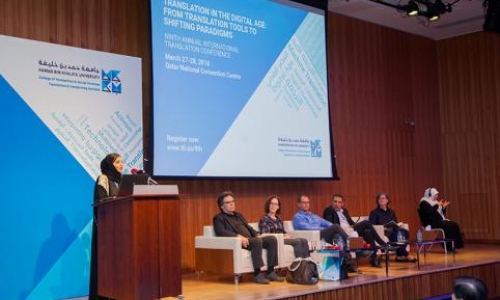HBKU Holds Ninth Annual International Translation Conference

The Translation and Interpreting Institute, part of the College of Humanities and Social Science within Hamad Bin Khalifa University, today initiated its Ninth Annual International Translation Conference, under the theme of “Translation in the Digital Age: From Translation Tools to Shifting Paradigms.” The two-day conference witnessed the attendance of more than 150 participants at the opening ceremony, which was held at Qatar National Convention Centre.
In her opening remarks, Dr. Amal Al-Malki, founding dean of the College of Humanities and Social Sciences, said, “Today we learn about how the digital helps humanistic causes to be amplified, circulated and given the digital edge and thus the global audience. Whether we are talking about gender equality or exposing human rights abuses or practicing freedom of speech, digital activism is a powerful form of activism that has proven thus far that when it makes noise, governments listen as well the rest of the world.”
The Ninth Annual International Translation Conference’s agenda included discussions, panels as well as workshops with leading scholars and experts in the translation and interpreting fields. The opening panel hosted experts in the digital and translation field, including Dr. Michaël Oustinoff from the University of Nice Sophia Antipolis who discussed the optimistic future of translation. Additionally, Dr. Maeve Olohan from the University of Manchester shed light on critical approaches to translation technologies. Joining the experts was Dr Jan-Louis Kruger from Macquarie University, who delved into the cognitive side of translation and interpretation. Finally, Dr. Yaser Bishr, the executive director of digital at Al Jazeera Media Network, also partook in this year’s inaugural panel and shed an industry insider’s perspective on translation.
Illustrating the impact of digital media advancements on translation, Dr. Yaser Bishr said, “I think the important message here is that the use of technology and artificial intelligence is becoming growingly integral to newsrooms around the world. Moving forward, we have to be truly cognizant of any related-ethical implications of that technology – as one of the most trusted media companies in the world, we will always remain careful to maintain that trust we have with our stakeholders as we find new ways to apply artificial intelligence in the newsrooms.”
Some of the panels have touched on topics that included machine translation, translation for specific purposes, non-professional translation, translation for the web, as well as translation and manipulation. The workshops addressed issues that relate to translation technologies using the popular Trados platform as an example.
This year, the conference is hosting 35 speakers hailing from nearly 20 countries, including Spain, Turkey, Qatar, India, USA, Finland, Morocco, China, Nigeria, Denmark, Ireland, Tunisia, Iran, Oman, Poland, and Canada. The conference is a unique networking opportunity to all participants, as it is widely attended by scholars and academics from local and international organizations; working professionals within the translation and interpreting industries; as well as university officials.








